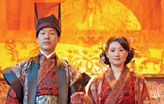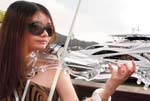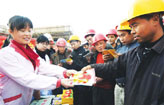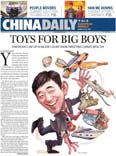Companies
Nestle China insists products 'absolutely safe'
Updated: 2011-04-13 16:10
By Qiu Bo (China Daily)
BEIJING - Nestle China released an announcement on Tuesday, saying its products are "absolutely safe for consumption", in response to earlier reports that cast doubt on the company's infant foods and alleged they contained toxic metals.
The announcement said Nestle products mentioned in the reports are neither produced nor sold in China. Nestle baby foods produced and sold in China are in full compliance with China's regulations and standards, it said.
An authoritative toxic test on baby food conducted by researchers in Sweden found some foods used to wean infants off milk contained "alarming" levels of toxic contaminants, including arsenic, lead and cadmium, the UK-based Daily Telegraph reported earlier this week.
| ||||
However, the Nestle announcement insisted its products are safe for infants and comply with all Nordic and European standards.
He Tong, a manager from Nestle China's publicity department, confirmed to China Daily on Tuesday that all the company's products are supervised by and examined by the Chinese authorities before they are sold.
"The quality and safety of our products is a top priority for Nestle," she said.
Nestle, one of the largest food producers in the world, started in business 138 years ago in Switzerland and was mainly involved in producing baby food from the start.
Wang Dingmian, former vice-chairman of the Guangdong Provincial Dairy Association, said Nestle is one of the top six dairy companies in the Chinese market.
"It retained annual revenue of more than 2 billion yuan ($300 million) in recent years," Wang said.
He Jiguo, a professor from the College of Food Science and Nutritional Engineering with the China Agricultural University, said the public does not need to worry because the level of arsenic meets national standards.
But Wang suggested the intake of accumulated amounts of arsenic over a long period could affect babies' health.
A spokeswoman, surnamed Wang, from the Beijing administration for industry and commerce, told China Daily that the administration has not received any reports or complaints about excessive arsenic in baby food recently.
Yang Xue, a resident in Chongqing, told Chongqing Morning Post on Monday that she tried to get a refund for six cases of Nestle's baby formula that she had bought for her son but that she wanted to return after hearing the news. She said the supermarket she bought them from rejected her request.
The General Administration of Quality Supervision, Inspection and Quarantine said last December that 670 tons of imported milk products had been found to be substandard between March 2010 and August 2010.
Among the substandard dairy products seized at the border, about 70 percent were baby formulas.
E-paper

Han me downs
Traditional 3,000-year-old clothes are making a comeback.
Reaching out
Fast growth fuels rise in super rich
Chinese tourists spend more
Specials

Big spenders
More mainland tourists are expected to spend money on overseas travel this year.

Rise in super rich
Report cites rising property prices, gdp as key drivers of increasing number of chinese millionaires.

Reaching out
Condom makers are stepping up their presence in smaller cities to boost sales



